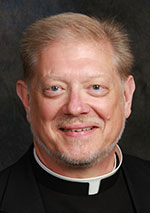That All May Be One / Fr. Rick Ginther
Ecumenism offers practical, pastoral ways to live out the Gospel
 I spent the weekend of Feb. 5-7 with the permanent deacons of the Diocese of Wheeling-Charleston, W. Va. They meet quarterly for retreat or updating.
I spent the weekend of Feb. 5-7 with the permanent deacons of the Diocese of Wheeling-Charleston, W. Va. They meet quarterly for retreat or updating.
Our topic was ecumenism, especially as they understand it and live it out in their ministry.
While together, we examined many scriptural texts, from chapter 17 of the Gospel of John, to chapter 13 of St. Paul’s First Letter to the Corinthians, to St. Paul’s Letter to the Ephesians.
We explored the seminal documents of the Second Vatican Council, especially “Lumen Gentium,” “Unitatis Redintegratio” and “Dignitatis Humanae.”
We delved into statements by several popes, including Pius XI, Benedict XV, Pius XII, St. John XXIII, St. John Paul II, Benedict XVI and Francis. We found a clear trajectory for embracing ecumenism by the Church.
In St. John Paul II’s monumental “Ut Unum Sint,” we found that ecumenism is an integral and permanent part of the Church living the Gospel.
As we reflected upon what we were about, I recalled Psalm 133:
“How good and how pleasant it is,
when brothers live in unity!
“It is like precious oil upon the head
running down upon the beard,
running down upon Aaron’s beard,
upon the collar of his robes.
“It is like the dew of Hermon, which falls on the heights of Zion. For there the Lord gives his blessing, life for ever” (Ps 133:1-3).
Pope Francis has stated: “Unity is a journey, not a destination.” We are on that journey together as a Church. All Christians are “brothers and sisters” journeying in the Lord.
Beyond documents, we explored how we strive to walk the journey of unity.
In an April 12, 2020, document of encouragement to bishops throughout the world called “The Bishop and Christian Unity: An Ecumenical Vademecum,” the Pontifical Council on Promoting Christian Unity outlined a “practical ecumenism,” a “pastoral ecumenism.”
Referencing paragraph 12 of “Unitatis Redintegratio,” the document states:
“The Second Vatican Council called on all Christians, united in their common efforts and bearing witness to a common hope, to set ‘in clearer relief the features of Christ the Servant.’ It noted that in many countries this cooperation was already taking place in defense of human dignity to relieve the afflictions of famine, natural disasters, illiteracy, poverty, housing shortage, and the unequal distribution of wealth.
“Today we might add to this list: coordinated Christian action to care for displaced and migrant peoples; the fight against modern day slavery and human trafficking; peace-building; advocacy for religious freedom; the fight against discrimination; defense of the sanctity of life and care for creation” (“The Bishop and Christian Unity: An Ecumenical Vademecum,” #38).
As we discovered, the ecumenical work of the Church intertwines intimately with social justice, human dignity and equity for all.
All Christians are summoned through the Gospel to attend to these needs. As such, ecumenism is both practical and pastoral.
We came to realize that three threads coursed through the very fabric of the documents, Scripture and pastoral experiences we shared: truth, love and living.
As ecumenically charged believers, we should seek to recognize the truth that the Spirit reveals through Christians.
Just so, as these same believers, we should seek to love one another as Christ has loved us.
And as brothers and sisters, we should seek to live together toward unity.
For deacons, priest, bishops, religious and laity, may we experience the pleasant balm and dew of this upon our very existence.
(Father Rick Ginther is director of the archdiocesan Office of Ecumenism and Interreligious Affairs. He is also the pastor of Our Lady of Lourdes Parish, Indianapolis.) †
 I spent the weekend of Feb. 5-7 with the permanent deacons of the Diocese of Wheeling-Charleston, W. Va. They meet quarterly for retreat or updating.
I spent the weekend of Feb. 5-7 with the permanent deacons of the Diocese of Wheeling-Charleston, W. Va. They meet quarterly for retreat or updating.